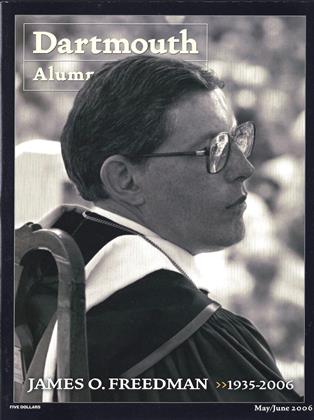ANDY DAVISON '05 COULD NOT have been any more our of place in his PE aerobics class last spring.
"The class was made up of me, a few girls and about 10 middle-aged women who work at the College, Davison recalls. "The instructor just played techno remixes of Madonna while we curled five-pound weights and did 'girly'-style push-ups.
"It was pretty embarrassing but I figured it was senior spring, so I wouldn't have to see any of the girls in the class again afterwards," Davison says.
Davison's story is not unique around the College, as with the right combination of procrastination and poor timing, students often find themselves scrambling during their final terms to fulfill the required three credits of physical education. In Davison's case, he entered his final term at Dartmouth one PE credit short of graduation. His tardiness in signing up for a class, combined with the subsequent lack of class openings, precipitated the inclusion of the 6-foot-3, 210-pound Davison—who in high school captained his basketball team and toiled as a lineman on his football squad—in the aerobics course.
"It's very uncommon that a student doesn't graduate by not completing the PE requirement," says Roger Demment, associate athletic director. "We do everything we can to help them complete it.
On occasion creative students need ing to finish their PE requirements will design an independent project in conjunction with the PE office to obtain a credit. Examples from the past few years include running a marathon, bowling and, in the case of kayaker Benjie Lewis '05, competing in the 2004 Summer Olympic Games.
Dartmouth's PE program dates back more than 100 years, and in its earlier incarnations students finished their requirements during freshman year. Eventually that deadline was extended to sophomore year before morphing into the current system. About one-quarter of students fulfill their PE obligations through participation in varsity athletics, though up until the late 1990s intercollegiate athletes only received two credits for their sport, leaving one credit to be completed on their own. Varsity athletes are still required to sign up under their respective sport in order to receive their credits.
Of the Ivy League institutions, only Dartmouth, Cornell and Columbia require PE credits for graduation. That doesn't mean that other Ivies don't have flourishing PE programs. At Yale 1,427 students enrolled for the winter/spring PE classes across 72 sections this year, even though those courses do not accrue credits toward graduation.
While some on campus find the PE requirement a hassle, the flexibility and wide range of classes—varying from traditional sports to classes on wilderness survival skills—offers something of interest to even the most athletically challenged (or procrastinating) Dartmouth student.
 View Full Issue
View Full Issue
More From This Issue
-
 Cover Story
Cover StoryThe Scholar President
May | June 2006 By JACQUES STEINBERG ’88 -
 Feature
FeatureCapitol Steps
May | June 2006 By ALICE GOMSTYN ’03 -
 Feature
FeatureThe Producer
May | June 2006 By Jennifer Wulff ’96 -
 Feature
FeatureNotebook
May | June 2006 By JOE MEHLING '69 -
 Feature
FeatureAlumni News
May | June 2006 By Gisela Insuaste '97 -
 Article
ArticleNewsmakers
May | June 2006 By BONNIE BARBER










